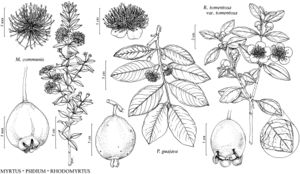Rhodomyrtus tomentosa var. tomentosa
Shrubs or small trees, to 2 m, young growth densely tomentose, hairs white or yellowish, curled. Leaves: blade elliptic to oblong-elliptic, 3.5–7 × 2–4 cm, venation with 3 strong, subequal veins, midvein and 2 arcing veins that arise from midvein a few mm distal to base and unitewith it near apex, base cuneate, apex rounded to obtuse. Peduncles 8–15 mm. Inflorescences: bracteolespersistent after anthesis, broadly ovate, 1–3 mm. Flowers: calyx lobes hemiorbiculate to ovate, unequal, to ca. 5 mm; petals elliptic-oblong, to ca. 2 cm; filaments pink or red; ovules biseriate, each ovule partially enclosed in a pocket of tissue that remains after ovule is extracted. Berries 10–15 mm. Seeds 20+, flattened horizontally.
Phenology: Flowering spring–early summer (or longer).
Habitat: Pinelands, Taxodium swamps, disturbed forests.
Elevation: 0–30 m.
Distribution
Introduced; Fla., se Asia (Borneo, Celebes Islands, Java, Lesser Sunda Islands, Malaya, Moluccas, Sumatra), Pacific Islands (Hawaii, Philippines).
Discussion
Variety tomentosa is known in the flora area from Collier County and the central peninsula.
Selected References
None.
